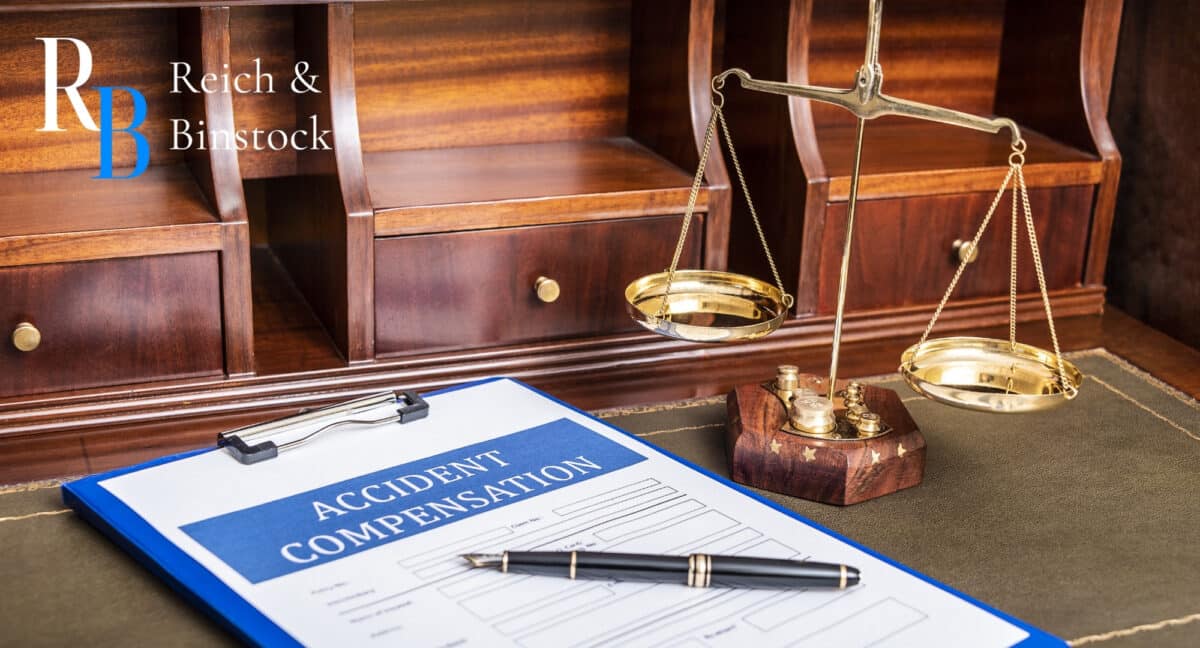When communicating with your insurance company about a settlement, it’s important to understand what a claims adjuster will look at when making a decision. In this blog, the law firm of Reich & Binstock will walk you through how to craft a demand letter, as well as how to write a counter offer letter if you’re not happy with the settlement offer. While it is possible to handle this process on your own, we highly recommend working with experienced personal injury lawyers. Insurance companies exist to make a profit, so they’ll try to get away with giving you the lowest possible offer. Our attorneys can help you with your personal injury claim and fight to get you the compensation you deserve. To schedule your free consultation with us, please call 713-622-7271 today.
How Do I Write a Demand Letter to an Insurance Company?
First, we’ll start with the initial demand letter. Demand letters are the backbone of your settlement negotiations. It’s important to work with your personal injury attorney to craft a thorough and logical demand letter to send to the insurance company. We recommend that you include all of the following information.
- Clearly outline the facts of your personal injury case. Let the insurance company know who was involved, what happened, when it happened, where it happened, and why you’re asking for a certain amount. Important supporting documents are police reports. These will support your claims about the accident.
- Include details about all of your injuries. Include supporting information, such as medical bills, records of your medical treatment, and estimated future medical expenses.
- Include photos and videos along with your police report. This will help to show that you are, in fact, the injured party.
- Include an estimate of your lost income and lost wages related to the accident. It may be difficult to pinpoint an exact number for your losses, but an estimate works just as well. This estimate should show how much more money you would have if you hadn’t needed to recover from the accident. One important supporting document could be a letter from your employer or historical earnings data if you’re self-employed.
- Outline the other damages you suffered from the accident. This should include both property damage and non-economic damages. Non-economic damages include pain and suffering, loss of consortium, and much more. Your personal injury attorney can help with calculating a reasonable value for these losses.
- Lastly, explain why you qualify to make this claim. Again, have your personal injury lawyer help with this step.
How Long Does It Take for Insurance to Respond to a Demand Letter?

The amount of time that it takes for an insurance company to respond to your letter can vary for a few reasons. Responsible companies should respond to your letter within 30 days. However, it could take weeks or even months to get a response. This is because no law requires these companies to respond to your initial demand at all. While you can set a deadline for a response in the letter, this might not make any difference. Below, we list the main factors that could influence the insurance company’s response time.
- Have you communicated with the company previously? If so, they will likely respond much faster.
- The larger your insurance claim, the more investigation the company will conduct before writing its response.
- Even pre-existing health conditions can influence their response time. They will take these conditions into consideration when evaluating your claim.
- How large is the insurance company? If the insurance adjuster has a very large caseload at a large company, it could take them a while to respond. For smaller companies with smaller claims adjuster caseloads, the opposite is true.
- What are the limits of the insurance policy in question? The larger the policy, the higher the potential payout. For this reason, the insurer will spend much more time investigating your claim.
Importantly, Texas law states that insurance companies only have 15 days to respond after a claim has been filed against them.
What Happens if the Insurance Company Doesn’t Respond to My Demand Letter?
If you sent your formal letter of demand some time ago, it might be time to let a seasoned law firm handle your claim. We will inform you of the statute of limitations (time limit) for your case and ensure that you meet all related deadlines. Personal injury victims can file a lawsuit against the insurance company. This gives them a legal obligation to respond to your claim.
Don’t worry about going to court. Although frustrating, sometimes a lawsuit is necessary to obtain a formal response from the insurer. Working with an experienced attorney for your personal injury lawsuit can be instrumental in receiving a fair settlement.
What to Expect in an Insurance Settlement Offer

Before you accept or reject the initial offer, you should understand what goes into the determination of that number. Just as an attorney will investigate your claim, an insurance adjuster will do the same. Below, we outline the factors that go into determining the adjuster’s offer.
- The adjuster will ask the alleged at-fault party about the accident. This allows them to compare both sides of the store. They will also read and examine any documents you attached to your demand letter.
- If you’ve ever filed a personal injury settlement claim before, the adjuster will be able to see this in a special database. This is more or less an investigation of you as the claimant.
- Once they review your claim, they will likely reach out to you and your attorney and ask for supporting documents. This might include medical records, tax returns, proof of damages, and more. It is unlikely that you will receive an initial settlement offer unless you provide all the requested information.
- Next, they determine the value of your settlement. Two main factors that they consider are what your chances of winning are and how much a jury might award you. For certain losses, the adjuster will do some simple math. For others, they have much more to consider when valuing your claim.
- Finally, they make an initial settlement offer. This will be a certain percentage of what they think your case is worth. If you’re not working with a law firm, the first offer will probably be low.
How Do You Know if a Settlement Offer Is Too Low?
Fortunately, there are a few red flags that signal a low initial settlement offer. Below, we list these telltale signs that you might be receiving a low settlement offer.
- The offer comes back a little too quickly.
- The company pressures the claimant to accept their offer. They might claim that the initial offer is high and that they’d better accept it while they can.
- They purposefully ignored or dismissed some of the evidence you provided. It’s possible that their end goal is to assign the blame to you instead of the at-fault party.
- Even if you provided evidence of your injuries, they still question their validity.
- They either refuse to explain or can’t explain their low settlement offer.
- They stop responding to you very suddenly. This is a common tactic that health insurance companies use. It’s another way of pressuring the claimant to accept the initial offer for fear of being unable to pay their bills.
Why Did I Receive a Lowball Settlement Offer?
Settlement negotiations can be very stressful, especially if you try to handle them without an attorney on your side. But why are insurance companies so keen to make such low settlement offers? Below, we list some of the reasons why your settlement offer was so low.
- The company is attempting to maximize profits by minimizing claim payouts.
- The offer was calculated by computers and algorithms rather than real adjusters.
- Many people accept the first offer, so they’re trying to get away with a lowball offer.
- Once you settle, you can’t receive more money for the same accident. If you accept a low offer, this will bar you from suing the company for fair compensation.
- You don’t have a lawyer, and they think they can take advantage of you because of this.
- They simply need more information. If you forgot to include a critical piece of evidence, this could have lowered the insurance company’s offer considerably.
How Do I Respond to Low Settlement Offers?

When you’re recovering from injuries and undergoing medical treatments, it’s in your best interest to follow the advice of a lawyer during negotiations. On top of painful injuries and mounting financial stress, you might have little patience for a low settlement offer. However, it’s important that you remember the following tips when you respond to a low offer.
- Carefully analyze the dollar amount you’re offered and remain calm while doing so. It is rarely a good idea to involve your emotions in settlement negotiations.
- Ask questions about the low settlement offer. Why did they make this specific offer? What factors did the adjuster include in their evaluation of your claim? If your claim was denied, why?
- Include any evidence you forgot when you sent your demand letter. As with many cases for accident victims, the more evidence you have, the better your chances are of receiving a fair settlement agreement.
- Work with your lawyer while you respond to a low offer and make a counter offer. This portion of the process might go back and forth for a while.
- Refuse to settle until you reach a fair settlement with fair compensation.
How Can I Reject a Low Insurance Settlement Offer?
We recommend that you reject the offer in writing rather than over the phone. Clearly list the reasons why you deserve more money and support your arguments with strong evidence. Have your attorney help you write the response and prepare strong arguments.
Factors to Consider When Countering a Personal Injury Settlement Offer

When you and your lawyer craft a counter offer, it’s important to remember a few important factors. Firstly, determine what is and is not acceptable from the first offer. Does it cover your medical bills and future medical treatment? Does it cover non-economic losses such as pain and suffering?
Secondly, what is the policy limit for the applicable insurance coverage? If your general damages exceed the limits of the policy, you’ve got a problem. Work with your attorney to determine the lowest possible amount you will accept for your injuries.
Refuse to accept any offers until you have fully healed. Even if your bills are piling up, you can’t afford to accept less than what your case is worth. This is why you must wait until your injuries have completely healed to see the full extent of your general damages.
What Happens if You Don’t Accept a Settlement?
After a lot of back and forth, if you don’t reach a settlement agreement, you can take your case to court. Ultimately, your final settlement is up to you. If you don’t feel that the insurance company has made you a fair offer, you can leave the case up to the courts to decide. However, keep in mind that most cases do not reach the point of going to court. Most car accident cases and other personal injury cases settle outside of court.
How a Personal Injury Lawyer Can Help You Negotiate a Settlement

Establishing an attorney-client relationship with an experienced lawyer can change the entire trajectory of your case. With years of experience under our belts, it’s much easier for us to investigate claims and gather evidence to support your case. Additionally, having a lawyer is likely to raise the initial settlement offer from the insurance company.
This is because insurance companies are relying on your lack of knowledge or eagerness to receive compensation for your accident. However, we have the knowledge necessary to hold the other party accountable for your losses and fight for a fair settlement.
Write an Effective Counter Offer Letter with Reich & Binstock
At Reich & Binstock, we have the tools and knowledge necessary to help you fight for your right to just compensation. After a car accident or other major personal injury, it’s imperative that you are compensated for your injuries, as well as your pain and suffering. Our Houston personal injury lawyers will help your case from start to finish. To schedule a free consultation with us, please contact our office at 713-622-7271 today.














